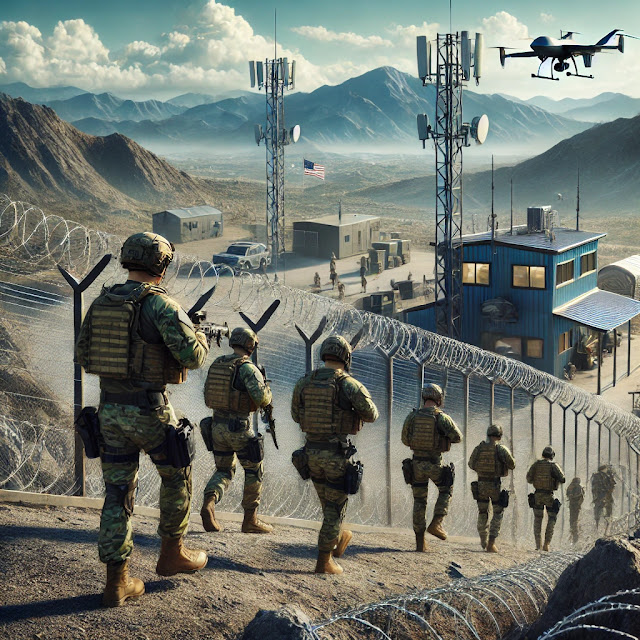 |
| The Role of Communication in Borders security forces (BSF)| Introduction about BSF |
Border Security Forces (BSF) play a critical role in maintaining national security by protecting and managing the country's borders. Below is a comprehensive explanation of their roles, responsibilities, and significance:
1. Introduction to Border Security Forces
Border Security Forces are specialized military or paramilitary organizations responsible for securing a country's international borders from illegal activities, foreign aggression, and trans-border crimes. In India, the BSF is the primary border guarding force, functioning under the Ministry of Home Affairs.
2. History of Border Security Forces
- Establishment: The BSF was established on December 1, 1965, in response to the 1965 India-Pakistan War, which revealed the need for a specialized border guarding force.
- It began as a small unit but grew over time into one of the world's largest border guarding forces.
3. Roles and Responsibilities of Border Security Forces
A. Border Security
- Prevent Infiltration and Exfiltration:
- Detect and prevent unauthorized entry or exit across borders by infiltrators, smugglers, or terrorists.
- Patrolling Borders:
- Conduct regular patrolling in rough and hostile terrain, including deserts, rivers, mountains, and forests.
- Monitoring Sensitive Border Areas:
- BSF guards international boundaries with neighboring countries, particularly along sensitive borders with Pakistan and Bangladesh.
B. Prevention of Trans-Border Crimes
- Stop Smuggling:
- Prevent smuggling of drugs, arms, contraband goods, and other illegal substances across the border.
- Combat Human Trafficking:
- Curb illegal movement of people, especially human trafficking and illegal immigration.
- Tackling Cattle Smuggling:
- The BSF plays a crucial role in stopping cattle smuggling, particularly along the Indo-Bangladesh border.
C. Counter-Terrorism and Insurgency
- Prevent Cross-Border Terrorism:
- Foil attempts by terrorist groups to infiltrate the border.
- Maintain Peace During Insurgency:
- BSF assists in maintaining internal peace and handles insurgencies in border regions.
D. Disaster Management and Relief
- Rescue Operations:
- Provide humanitarian assistance during natural disasters like floods, earthquakes, and cyclones in border areas.
- Medical Aid and Supplies:
- Deliver medical help to civilians in border villages.
E. Intelligence Gathering
- Collecting and Sharing Information:
- Gather intelligence regarding border activities and share it with security agencies to ensure effective action.
F. Aid to Civil Authorities
- Assisting in Elections:
- Provide security during elections, particularly in sensitive regions.
- Law and Order:
- Assist local police in maintaining law and order during riots or protests.
G. Promoting Border Area Development
- Development of Infrastructure:
- Collaborate in building roads, schools, and communication infrastructure in remote border areas.
- Community Outreach:
- Engage with civilians to improve relationships and trust between the border security forces and local communities.
4. Importance of Communication in Border Security Forces
Communication is a critical aspect of border security forces for the following reasons:
-
Coordination and Command:
- Seamless communication ensures that orders are transmitted quickly from higher commands to forces on the ground.
- Use of modern communication tools like radio communication, satellite systems, and encrypted devices ensures swift responses.
-
Intelligence and Surveillance:
- Real-time sharing of intelligence helps detect and prevent threats like infiltration, terrorism, and smuggling.
-
Emergency Responses:
- Effective communication enables faster deployment of troops and resources during emergencies like incursions or disasters.
-
Cross-Border Dialogues:
- Communication with foreign counterparts through scheduled border meetings helps in resolving disputes and maintaining peace.
-
Public Relations:
- Communication with border communities builds trust and helps in gathering valuable information about illegal activities.
5. Technological Tools for Communication
Modern border security forces use advanced communication and surveillance technologies:
- Satellite Communication Systems
- Drones and Unmanned Aerial Vehicles (UAVs) for surveillance
- Encrypted Radio Communication
- Thermal Imaging Devices
- Electronic Surveillance Systems
These technologies help improve the efficiency of operations and reduce risks.
6. Challenges Faced by Border Security Forces
Despite their critical role, border security forces face numerous challenges:
- Difficult Terrain and Climate:
- Border forces operate in extreme weather and challenging landscapes, such as deserts, mountains, and dense forests.
- Cross-Border Threats:
- Terrorism, smuggling, and infiltration continue to be persistent challenges.
- Lack of Resources:
- Insufficient infrastructure and lack of advanced technology can hamper operations.
- Human Rights Issues:
- Border forces often face criticism regarding the treatment of civilians near borders.
- Stress and Mental Health:
- Long deployments and harsh working conditions impact the well-being of soldiers.
7. Significance of Border Security Forces
- Protect the country's territorial integrity and sovereignty.
- Prevent illegal activities and maintain peace in border regions.
- Boost national security and ensure a peaceful environment for citizens.
- Contribute to international diplomacy through border agreements and communication with neighboring forces.
8. Conclusion
Border Security Forces play an indispensable role in safeguarding a nation’s borders, ensuring internal security, and promoting peace. Their multifaceted responsibilities—from combating cross-border crimes to assisting in disaster relief—demonstrate their importance in both defense and humanitarian roles. Effective communication, backed by advanced technology, is critical to their success in protecting national boundaries.
The dedication, discipline, and sacrifices of border security personnel ensure that citizens can live in peace and security.


.jpg)















Follow Us